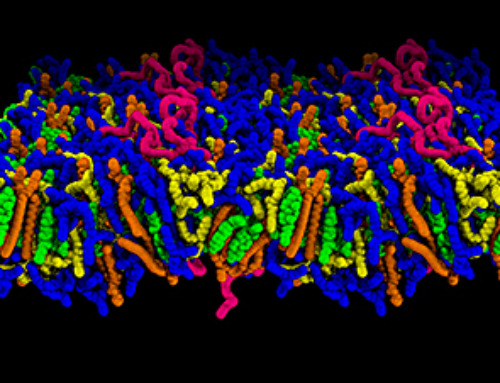Researchers have long studied magnetotactic bacteria (MTB), aquatic microbes that have the ability to orientate themselves to magnetic fields. This unusual behaviour makes them a subject of interest for improving our understanding of biomagnetism, and potentially harnessing their abilities for future technologies, such as medical nanorobots. Neutrons have been used to explore the characteristics of this magnetism by probing the specialised parts of the cells that are involved.
MTBs exert their magnetic navigation skills using magnetosomes – membrane structures containing magnetic nanoparticles that the bacteria mineralise from their environment. The magnetosomes arrange in a chain that acts like a magnetic compass, allowing the bacteria to move toward the riverbeds they inhabit, using the Earth’s magnetic fields. These unusual nanoparticles have been examined with neutron beams to discover the underlying mechanisms that determine the arrangement and geometry of the chains.
An international collaboration of researchers from University of the Basque Countries, University of Cantabria and the Institut Laue Langevin (ILL) have elucidated the precise structural configuration of the magnetosomes in the MTB strain Magnetospirillum gryphiswaldense. They carried out small-angle neutron scattering (SANS) on a colloid of MTB, a technique that allows them to see the magnetic microstructure of the organisms in detail in aqueous solution. The D33 instrument was employed because of its polarised neutron beam mode, which allowed the researchers to analyse both the structural components and magnetic arrangement – possible because neutrons will interact with both. Magnetic nanoparticles are central to many applications, ranging from biomedical diagnostics to data storage, and even hyperthermia cancer treatments, but the magnetic structures within and in between nanoparticles are challenging to probe directly. Neutron-spin resolved small-angle neutron scattering is one of the few tools that can be used to investigate nanoparticles.
Using SANS, the researchers have gained new insight into the structure of the magnetosome chain.
Image Credit: CC0 Public Domain
News This Week
NanoMedical Brain/Cloud Interface – Explorations and Implications. A new book from Frank Boehm
New book from Frank Boehm, NanoappsMedical Inc Founder: This book explores the future hypothetical possibility that the cerebral cortex of the human brain might be seamlessly, safely, and securely connected with the Cloud via [...]
How lipid nanoparticles carrying vaccines release their cargo
A study from FAU has shown that lipid nanoparticles restructure their membrane significantly after being absorbed into a cell and ending up in an acidic environment. Vaccines and other medicines are often packed in [...]
New book from NanoappsMedical Inc – Molecular Manufacturing: The Future of Nanomedicine
This book explores the revolutionary potential of atomically precise manufacturing technologies to transform global healthcare, as well as practically every other sector across society. This forward-thinking volume examines how envisaged Factory@Home systems might enable the cost-effective [...]
A Virus Designed in the Lab Could Help Defeat Antibiotic Resistance
Scientists can now design bacteria-killing viruses from DNA, opening a faster path to fighting superbugs. Bacteriophages have been used as treatments for bacterial infections for more than a century. Interest in these viruses is rising [...]
Sleep Deprivation Triggers a Strange Brain Cleanup
When you don’t sleep enough, your brain may clean itself at the exact moment you need it to think. Most people recognize the sensation. After a night of inadequate sleep, staying focused becomes harder [...]
Lab-grown corticospinal neurons offer new models for ALS and spinal injuries
Researchers have developed a way to grow a highly specialized subset of brain nerve cells that are involved in motor neuron disease and damaged in spinal injuries. Their study, published today in eLife as the final [...]
Urgent warning over deadly ‘brain swelling’ virus amid fears it could spread globally
Airports across Asia have been put on high alert after India confirmed two cases of the deadly Nipah virus in the state of West Bengal over the past month. Thailand, Nepal and Vietnam are among the [...]
This Vaccine Stops Bird Flu Before It Reaches the Lungs
A new nasal spray vaccine could stop bird flu at the door — blocking infection, reducing spread, and helping head off the next pandemic. Since first appearing in the United States in 2014, H5N1 [...]
These two viruses may become the next public health threats, scientists say
Two emerging pathogens with animal origins—influenza D virus and canine coronavirus—have so far been quietly flying under the radar, but researchers warn conditions are ripe for the viruses to spread more widely among humans. [...]
COVID-19 viral fragments shown to target and kill specific immune cells
COVID-19 viral fragments shown to target and kill specific immune cells in UCLA-led study Clues about extreme cases and omicron’s effects come from a cross-disciplinary international research team New research shows that after the [...]
Smaller Than a Grain of Salt: Engineers Create the World’s Tiniest Wireless Brain Implant
A salt-grain-sized neural implant can record and transmit brain activity wirelessly for extended periods. Researchers at Cornell University, working with collaborators, have created an extremely small neural implant that can sit on a grain of [...]
Scientists Develop a New Way To See Inside the Human Body Using 3D Color Imaging
A newly developed imaging method blends ultrasound and photoacoustics to capture both tissue structure and blood-vessel function in 3D. By blending two powerful imaging methods, researchers from Caltech and USC have developed a new way to [...]
Brain waves could help paralyzed patients move again
People with spinal cord injuries often lose the ability to move their arms or legs. In many cases, the nerves in the limbs remain healthy, and the brain continues to function normally. The loss of [...]
Scientists Discover a New “Cleanup Hub” Inside the Human Brain
A newly identified lymphatic drainage pathway along the middle meningeal artery reveals how the human brain clears waste. How does the brain clear away waste? This task is handled by the brain’s lymphatic drainage [...]
New Drug Slashes Dangerous Blood Fats by Nearly 40% in First Human Trial
Scientists have found a way to fine-tune a central fat-control pathway in the liver, reducing harmful blood triglycerides while preserving beneficial cholesterol functions. When we eat, the body turns surplus calories into molecules called [...]
A Simple Brain Scan May Help Restore Movement After Paralysis
A brain cap and smart algorithms may one day help paralyzed patients turn thought into movement—no surgery required. People with spinal cord injuries often experience partial or complete loss of movement in their arms [...]






















Leave A Comment